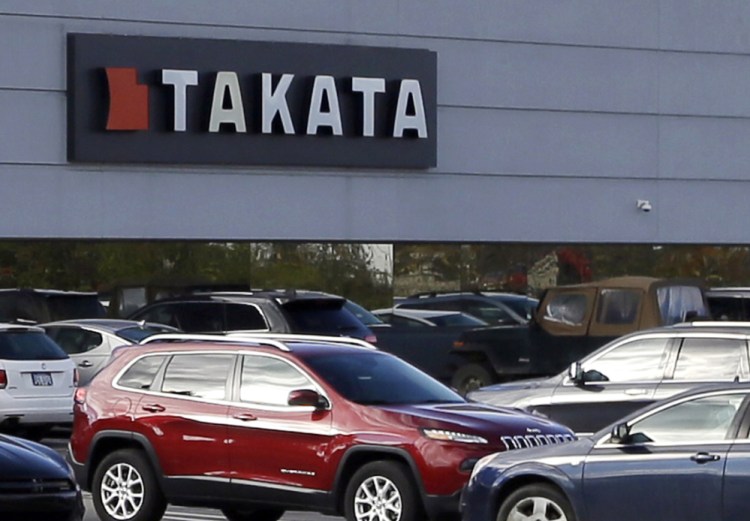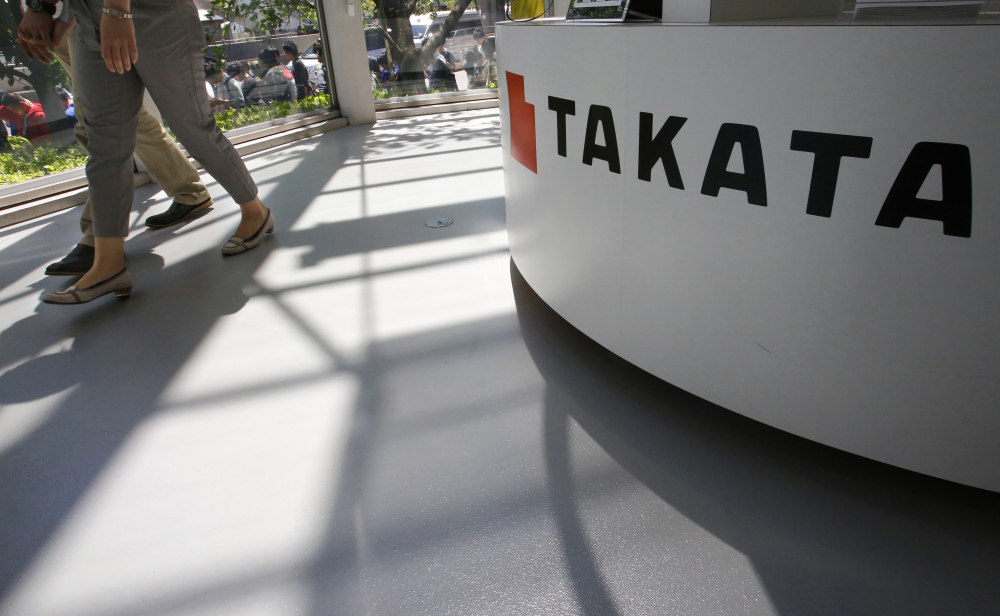DETROIT — Takata agreed to plead guilty to wire fraud and pay a total of $1 billion in criminal penalties related to the sale of defective airbag inflators, the U.S. Department of Justice said Friday.
In addition, a federal grand jury indicted three former Takata employees Friday on charges of wire fraud and conspiracy, accusing them of concealing defects in the company’s air bag inflators.
“Automotive suppliers who sell products that are supposed to protect consumers from injury or death must put safety ahead of profits,” U.S. Attorney Barbara McQuade said in a statement. “Cheaters will not be able to gain an advantage over good corporate citizens who play be the rules.”
Shinichi Tanaka, Hideo Nakajima and Tsuneo Chikaraishi are charged with one count of conspiracy and five counts of wire fraud related to concealing from Takata’s automaker customers that the inflators did not perform up to customers’ specifications. Tanaka’s former title with the company was executive vice president of global operations; Nakajima was director of engineering at Takata’s automotive systems lab; and Chikaraishi was chief of Japan Asia air bag inflator operations.
“Reaching this agreement is a major step towards resolving the airbag inflator issue and a key milestone in the ongoing process to secure investment in Takata,” Shigehisa Takada, Takata chairman and CEO said in a statement. “Takata deeply regrets the circumstances that have led to this situation and remains fully committed to being part of the solution.
“We have taken aggressive actions to address past reporting lapses and will continue to work closely with regulators and our automotive customers to address the ongoing recalls and implement new technologies that advance vehicle safety, prevent injuries and save lives.”
As a result of Takata’s defective inflators, the National Highway Traffic Safety Administration is in the middle of the largest ever recall, covering 42 million vehicles (69 million inflators) covering more than 12 automakers.
“For more than a decade, Takata repeatedly and systematically falsified critical test data related to the safety of its products, putting profits and production schedules ahead of safety,” Andrew Weissman, chief of the Justice Department’s fraud section, said in a statement.
Takata air bag inflators can explode with too much force, spraying shrapnel into drivers and passengers.
The defect has been connected to 16 deaths worldwide, 11 of them in the U.S., and more than 180 injuries.
McQuaid said Takata knew since at least the early 2000s that certain ammonium nitrate-based inflators were not performing to the specifications required by the auto manufacturers. Takata also knew that certain inflators had sustained failures, including ruptures, during testing but still continued to sell the products to manufacturers.
The company persuaded automakers to continue to buy its potentially defective airbags by submitting false and fraudulent reports and other information that concealed the true condition of the inflators.
Employees had discussions about the false reports and several senior executives were aware of the problems, the Justice Department said.
Takata’s $1 billion payment includes a $25 million fine and $975 million in restitution. Of that latter amount, $125 million will go into a compensation fund for victims already known, those who haven’t yet come forward and also future victims. The remaining $850 million will go to help the automakers who are removing the bad air bag inflators and replacing with new safer ones.
The $25 million fine and $150 million of the restitution must be paid within 30 days. The remainder is to be paid over the next year.
Takata has received acquisition bids from as many as five sources, including such competitors as Autoliv and Key Safety Systems.
If an acquisition happens, the buyer likely will be liable for recall costs and will be obligated to supply enough replacement parts to automakers.
“The government may have a difficult balancing act with Takata that it did not have with Toyota, GM and Volkswagen,” said Carl Tobias, a University of Richmond law professor.
“How much money can it extract as a deterrent and still allow the company to keep operating so as to repair the damage done.”
McQuaid said the parties have recommended that U.S. District Judge George Caram Steeh appoint Ken Feinberg to administer the compensation fund. Feinberg oversaw a similar fund set up to compensate victims of accidents caused by General Motors’ defective ignition switches installed a range of small cars produced between 2003 and 2007 model years.
He also led compensation programs for victims of the Sept. 11, 2001, terrorist attack on the World Trade Center and those who suffered business and residential losses from the 2010 British Petroleum Deepwater Horizon oil release.
McQuaid said all three defendants are no longer employed by Takata and live in Japan to the best of her knowledge.
They had not been notified of the charges before Friday. McQuaid said the office will request their extradition, which is not automatic under U.S.-Japan relations.
Prior to today’s indictments, Takata had already agreed to pay up to $200 million in civil penalties in a deal with NHTSA.
Takata officials have said the risk of the inflators detonating is greater in states in the South and along the Gulf Coast, along with Puerto Rico, where intense heat and humidity occur for longer periods.
“Companies have a responsibility to ensure the products they make are safe for consumers,” U.S. Sen. Bill Nelson, the top Democrat on the Senate Commerce Committee, said in a statement.
“These indictments send a strong message that if company executives knowingly put deadly products on the market, they will held accountable for their actions.”
The FBI also has been investigating allegations that the company deceived federal regulators and tried to cover up the air bag problems.
The cause of the defect was a compound called ammonium nitrate that Takata used as the propellant to ignite the inflators. Ammonium nitrate was described in the indictment as a “highly combustible and unstable chemical compound.”
Takata distributed a modified and purportedly safe and stable variation called PSAN (phased stabilized ammonium nitrate), and many of the inflators tested did meet specifications. But when some of the inflators rupture during testing, the indictment alleges that Tanaka, Nakajima and Chikaraishi discussed fabricating test results and data and removed unfavorable test results and data.
Send questions/comments to the editors.





Success. Please wait for the page to reload. If the page does not reload within 5 seconds, please refresh the page.
Enter your email and password to access comments.
Hi, to comment on stories you must . This profile is in addition to your subscription and website login.
Already have a commenting profile? .
Invalid username/password.
Please check your email to confirm and complete your registration.
Only subscribers are eligible to post comments. Please subscribe or login first for digital access. Here’s why.
Use the form below to reset your password. When you've submitted your account email, we will send an email with a reset code.